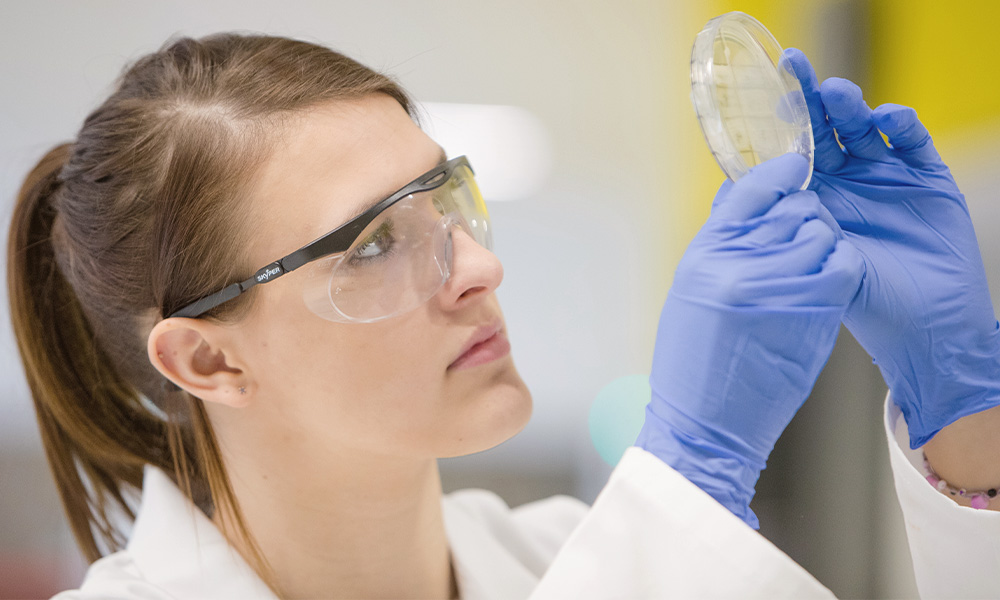Whether you're passionate about environmental conservation, medical advancements, or biotechnology, studying our Biology BSc (Study Abroad) will help you play a crucial role in shaping a better future.
Explore how a biology degree can empower you to make a difference in the world….
Play a role in tackling the world’s greatest challenges:
- How do we feed a growing population?
- How can we fight some of the world’s most deadly or chronic diseases?
- How do we prevent greater environmental damage to our seas, air, animal and plant species?
These are the types of major global challenges that a degree in biology will prepare you to play your part in addressing.
By studying this Biology BSc (Study Abroad), you will gain an understanding of life in all its forms: from cells and molecules to whole organisms and ecosystems; from cell division to reproduction, development and death; from fruit flies to fungi.
There are few limits to where this knowledge and understanding can take you. Indeed, there are biologists working in almost every scientific field imaginable – whether that’s exploring how our genome can affect our risk of cancer or exploring ways to make global ecosystems more resilient.
Biology is an interdisciplinary subject. Our academics have carefully designed this programme to start by providing you with a broad grounding in the range of fundamental themes that lie at its heart.
With this foundation, you can go on to explore the aspects of biology that interest you most in greater depth. It’s this ability to shape your studies to suit your passions that makes biology the most flexible of our biosciences degrees.
Taught by internationally renowned academics, you will get a truly hands-on degree. As well as lectures and tutorials, you will learn in our excellent lab facilities and, depending on your choice of modules, through exciting field trips.
This research-led biology degree is an ideal basis for a host of careers across the life sciences, ecology or conservation sectors, offering you the scientific knowledge, practical lab skills and career-ready mindset to succeed.
By studying abroad in your third year, you will have an opportunity to explore new and different perspectives on your course, while gaining experience of what it is like to live and study in a different country. During your year abroad you are only required to pay 15 per cent of the standard tuition fees.
And, because you will build your skills and competence in experimental design, data recording, analysis and presentation, effective project management, teamwork and communication, you will have highly-transferable skills valued by employers both within the sciences and in broader fields such as marketing, finance and management.
Why study biology at Lancaster University?
- Shape your degree to suit your interests as they develop through your course
- Gain practical skills in our outstanding teaching labs
- Pay just 15% of the standard tuition fee during your year abroad
- Become a part of our thriving and supportive community of biosciences students
- Learn from our renowned, research-active academics
- Benefit from placements or part-time work through our connections with public and private sector employers
- Our location, close to Morecambe Bay, the Lake District, Bowland Fells and the Yorkshire Dales is ideal for exploring some of the UK’s finest natural landscapes
Your journey through biology
Your degree will offer you a firm foundation in a breadth of subjects in biology, before allowing you to specialize, if you wish , as your course progresses.
- In Year 1, you will get a well-rounded introduction to the fundamentals of biology. From genetics and cell biology to ecology, conservation biology and zoology, you will lay the foundations for the future of your degree: getting to grips with key skills and discovering where your greatest interests lie. You will also see how these issues relate to the bigger picture, gaining an understanding of how they link to global challenges, such as the maintenance of biodiversity and human health.
- In Year 2 you will explore themes such as genetics and evolution in more depth. You can also begin to tailor your degree to your emerging interests.
- You will spend Year 3 studying at one of our trusted overseas partner universities, immersing yourself in a different culture, meeting new people with diverse perspectives and developing a confident and well-rounded outlook for your final year back in Lancaster. By studying abroad you will be able to experience living in another country and exploring different and diverse sides of your degree subject.
- In Year 4, you can take that specialisation a step further with a greater choice of modules.
You will also complete a research project – your opportunity to make a unique contribution to increasing scientific knowledge in an area of biology.
You might choose to carry out your research in our excellent life sciences labs, or you might gather data out in our ‘living laboratory’ – the coastal, rural and mountainous landscapes that are in easy reach of Lancaster University. Either way, you will be supported by our research-active academics.
A hands-on course
Our state-of-the-art life science teaching laboratories will be at the heart of your degree. They are where you will put the knowledge you have acquired from lectures and tutorials into practice and get to know your course-mates and academics.
You will gain hands-on experience (depending upon your specialisation) of using equipment and facilities such as:
- Our new Wolfson plant phenotyping centre
- Fluorescent imaging
- Controlled environment plant growth facilities
- VR total immersion lab
- Confocal microscopes
- Flow cytometers
- Spectrophotometric technologies
- Plate readers
- Thermocyclers
- Microscopes
In addition to laboratory practical classes and workshops, you will learn through lectures, workshops, laboratory reports, essays and case studies, presentations, tests and exams. You will also benefit from digital resources through our online learning environment which will support your independent learning.
Altogether, your classroom learning and practical experience means you will graduate with a scientific understanding of biology, as well as the mindset, confidence and workplace experience to stand out in the competitive world of employment.












